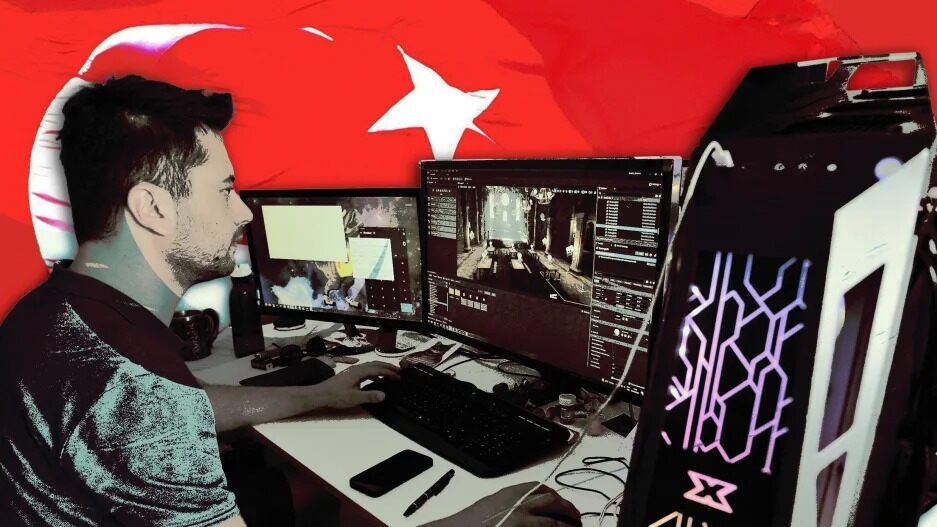- | 8:00 am
How Turkey built a thriving gaming industry—and how it’s informing other countries’ gaming push
Turkey’s gaming sector has been a success story for the country. Now others—especially Saudi Arabia—want to replicate it on a bigger scale.

When Volkan Taban cofounded Gamester in 2009 to develop browser and mobile games, his company was one of only a handful of companies in Turkey’s gaming industry. A dearth of local talent made scaling in a nascent space challenging. “Since there were no companies, there were no experienced workers. Since there were no experienced workers, there were no successful companies,” he says.
As Turkey has welcomed more gaming start-ups over the ensuing 15 years, gaming talent started to emerge as a natural response to rising demand. By the time Gamester launched its education-focused game studio Gamester Kids in 2020, the company was operating in a much different industry than it had launched into. In the last decade, Turkey has become a global hotbed for mobile game development, making the country a magnet for up-and-coming game developers (more than 740 gaming startups operate in Turkey). Between 2018 and 2022 Turkish gaming start-ups raised more than $1 billion in funding—bringing in cash at a 263% compound annual growth rate and far outpacing funding in other countries in the Middle East and North Africa.
It helps that there’s demand, both in Turkey and around the world. More than 48% of the 86 million people in Turkey are under the age of 30 and over 92% of internet users play games in Turkey compared to the world average of 82%. Mobile gaming saw over 2.1 billion downloads across all platforms in the country in 2022—due at least in part to 78% of residents owning a smartphone.
Worldwide, revenue in the global gaming market is expected to hit $212.4 billion in revenue by 2026 with mobile games becoming a major driver. According to gaming market research firm Newzoo, mobile game revenues accounted for 49% ($92.6 billion) of the global gaming market in 2023 while console games contributed 30% ($56.1 billion) to the overall revenue. Revenue growth will be buttressed by a growing gamer population, which is projected to hit 3.4 billion players in 2023.
Turkey’s gaming boom has brought a global audience to Turkish companies, and its government has helped encourage growth through both university programs and government initiatives that aid up-and-coming companies, building strong career options for young people.
“Turkey has proven itself to be incredibly capable when it comes to development and programming,” says Joost van Dreunen, a professor at New York University and an expert in video games. “It has the technical skill, and it’s really recognized over time as a very solid economy for gaming, both to make and to play them.”
Gaming’s success in Turkey has created a model for other countries in the region, including Saudi Arabia, which, with its focus on console/PC games and esports, could complement Turkey’s mobile game prowess and bolster the game-development industry in the Middle East and North Africa.
BOOM TIME
In 2020, Istanbul-based gaming startup Peak Games became Turkey’s first billion-dollar startup when it was acquired by social game developer Zynga—the company behind Words With Friends—for $1.8 billion. Shortly after, Peak Games founder Soner Aydemir launched Dream Games which has raised close to $500 million and holds a valuation of $2.75 billion. It’s indicative of how the industry’s success has created a flywheel to keep the sector growing amid friendly government policies and success in taking games to international audiences.
“Successful companies [secured] investments, they got qualified, experienced workers. [Founders then leave] the company, found other companies, get some investment and it only grows from there,” Volkan says.
At the same time, the Turkish government has also churned out multiple incentives for gaming start-ups. Companies based in the R&D zones are exempt from paying corporate tax while companies making money through exported services are reimbursed 50% to 80% of their costs under several categories including marketing, outsourcing and overseas expansion.
While early successes in the industry were local sensations—one of Peak Games’ earliest successes was Komşu Çiftlik, a 2010 game that was similar to FarmVille and gained over a million Facebook followers. Turkish gaming studios have also been incredibly successful in scaling the games to cater to a global audience: In May 2021, 20% of the most downloaded mobile games in the US were developed by Turkish studios.
A majority of the people who play games developed by Istanbul-based Veloxia are in either Europe or the United States—with less than 1% of its audience living in Turkey. Veloxia’s most popular game, Space Colony: Idle has been downloaded more than 1.5 million times and has players train astronauts and construct colonies in space among colorful sci-fi planets.
“It is much cheaper to recruit users [in Turkey], but they don’t make you money. So, [companies] go for the higher GDP-per-capita countries,” says Tugay Alyıldız, the founder of Veloxia. Volkan agrees: “Gaming is kind of international. You start building something from [Turkey], but you can immediately release it in Brazil and get a Brazilian audience.”
That’s not to say that some games aren’t thriving in the Middle East and North Africa. More recently, educational games have proven popular for Gamester Kids, whose most popular game, Tiny Minies, has been downloaded some 2 million times in the past year, generating close to $1 million in revenue. But games also have broader appeal, which creates opportunity for personalization. Because Tiny Minies is offered in Arabic, Turkish, Portuguese and English, the game tries to tailor some content to be familiar to children playing.
“If we’re teaching numbers, for example, in Brazil we will show avocados to the kids. But if we’re teaching numbers in, for example, Saudi Arabia, we’re using dates,” Taban says.
Demand for education games—and games more generally—was partly fueled by the pandemic. Fifty-eight percent of all game studios in Turkey were established in 2020 or after, a clear indication of the acceleration incited by the pandemic. At its height, Alyildiz says, “We saw significant decrease in people spending on different industries, and quite a bit of it was poured into gaming.”
Gaming as a recreational activity emerged from the worst of the pandemic as a more culturally acceptable hobby, and a medium to socialize. “The pandemic accelerated (the growth of gaming) and became somewhat of a catalyst,” van Dreunen says. “It in many ways has normalized or destigmatized video games, interactive entertainment, and particularly online gameplay as a form of cultural expression and entertainment. What used to be this weird phenomenon has become much more accepted broadly.”
More widespread gaming has fueled demand and created opportunities at a time when Turkey has been navigating an economic crisis that has heavily devalued the Turkish lira and increased inflation to over 65%. Making it big in the gaming industry became a young person’s climb toward a higher-class status. While software engineers in Turkey make around 40,000 Turkish Liras (around $1,330) per month, gaming start-ups offer an attractive monthly salary ranging from 75,000 to 150,000 Turkish Liras (between $2,490 to $4,980) to fresh engineering graduates.
“Gaming has started a new career path for the (young) people,” Taban says. With the advent of more gaming companies, demand for game developers soared tremendously. Turkish universities began offering degrees in game design and calls for game jams and gamification hackathons saturated the internet.
Turkey has been so successful that other countries in the region—particularly Saudi Arabia, which has begun funding gaming at unprecedented levels in the past several years—are following suit, hoping to cash in on the boom and attract gaming audiences and companies from all over the world.
ANOTHER PLAYER IN THE REGION
Saudi Arabia has been making ambitious strides when it comes to becoming the global hub for games and esports by 2030. According to the Saudi Esports Federation Chairman, Prince Faisal bin Bandar, the country’s goal is to “ultimately to develop the global ecosystem of esports.”
The country is pouring over $40 billion into its effort become a gaming powerhouse and attract gamers from across the world. Its efforts have so far included an esports festival hosted in Riyadh in July 2023 with prize money of $45 million.
This investment makes sense: Saudi Arabia is home to 23.5 million gaming enthusiasts, which is about 67% of its population. The country’s average disposable income is high, and the sweltering weather means spending more time spent indoors, making gaming a highly sought after recreational activity.
“It’s like they’re building infrastructure. They want to become a place of note in the same way that Korea did that a few decades ago, in the same way that China became a much more significant player in the games industry globally in the last 10 to 15 years with companies like Tencent and NetEase,” NYU’s van Dreunen says.
With 40% of Saudi Arabia’s GDP dependent petroleum exports, investing in gaming could also hedge its economy’s bets. “I think it’s a very sophisticated approach to reducing its reliance on oil, the bulk of its economy,” van Dreunen says. The kingdom projects that the gaming industry wilt only contribute more than $13 billion in the country’s GDP by 2030 but will also bring nearly 40,000 jobs.
The successful exit of Turkey’s gaming unicorns is paving the way for more gaming companies to emerge out of the Middle East. “Investment from that perspective builds appetite when you can see a clear path to exit, whether it’s IPO and or acquisitions,” says Philip Bahoshy, founder of technology platform Magnitt. “If you compare the total number of exits from 2018 to 2022, gaming across Middle East, North Africa, and Turkey is the third most exited industry out of all industries. First is e-commerce, second is fintech and third is gaming.”
Even in spite of Turkey’s continued success, does the growing gaming sector in capital-loaded neighbors can pose a looming threat to Turkey’s established industry? Founders like Gamester Kids’s Taban see it as an opportunity to thrive further and collaborate with investors in other countries, or even for Turkey to export its game developers and engineers. “We want to be a part of this journey, because we know the region, we have cultural ties [with them) and we understand them better,” Taban says. “It’s an opportunity for us.”








































